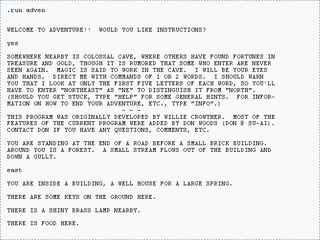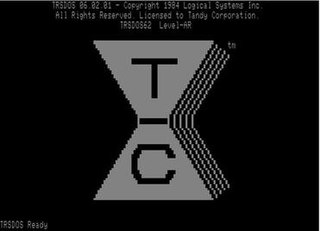Infocom was an American software company based in Cambridge, Massachusetts, that produced numerous works of interactive fiction. They also produced a business application, a relational database called Cornerstone.

Interactive fiction, often abbreviated IF, is software simulating environments in which players use text commands to control characters and influence the environment. Works in this form can be understood as literary narratives, either in the form of interactive narratives or interactive narrations. These works can also be understood as a form of video game, either in the form of an adventure game or role-playing game. In common usage, the term refers to text adventures, a type of adventure game where the entire interface can be "text-only", however, graphic text adventures still fall under the text adventure category if the main way to interact with the game is by typing text. Some users of the term distinguish between interactive fiction, known as "Puzzle-free", that focuses on narrative, and "text adventures" that focus on puzzles.

A shell script is a computer program designed to be run by a Unix shell, a command-line interpreter. The various dialects of shell scripts are considered to be scripting languages. Typical operations performed by shell scripts include file manipulation, program execution, and printing text. A script which sets up the environment, runs the program, and does any necessary cleanup or logging, is called a wrapper.
The Z-machine is a virtual machine that was developed by Joel Berez and Marc Blank in 1979 and used by Infocom for its text adventure games. Infocom compiled game code to files containing Z-machine instructions and could therefore port its text adventures to a new platform simply by writing a Z-machine implementation for that platform. With the large number of incompatible home computer systems in use at the time, this was an important advantage over using native code or developing a compiler for each system.

CP/M, originally standing for Control Program/Monitor and later Control Program for Microcomputers, is a mass-market operating system created in 1974 for Intel 8080/85-based microcomputers by Gary Kildall of Digital Research, Inc. Initially confined to single-tasking on 8-bit processors and no more than 64 kilobytes of memory, later versions of CP/M added multi-user variations and were migrated to 16-bit processors.
RT-11 is a discontinued small, low-end, single-user real-time operating system for the full line of Digital Equipment Corporation PDP-11 16-bit computers. RT-11 was first implemented in 1970. It was widely used for real-time computing systems, process control, and data acquisition across all PDP-11s. It was also used for low-cost general-use computing.
A filename extension, file name extension or file extension is a suffix to the name of a computer file. The extension indicates a characteristic of the file contents or its intended use. A filename extension is typically delimited from the rest of the filename with a full stop (period), but in some systems it is separated with spaces. Other extension formats include dashes and/or underscores on early versions of Linux and some versions of IBM AIX.
Inform is a programming language and design system for interactive fiction originally created in 1993 by Graham Nelson. Inform can generate programs designed for the Z-code or Glulx virtual machines. Versions 1 through 5 were released between 1993 and 1996. Around 1996, Nelson rewrote Inform from first principles to create version 6. Over the following decade, version 6 became reasonably stable and a popular language for writing interactive fiction. In 2006, Nelson released Inform 7, a completely new language based on principles of natural language and a new set of tools based around a book-publishing metaphor.
Text Adventure Development System (TADS) is a prototype-based domain-specific programming language and set of standard libraries for creating interactive fiction (IF) games.
Quetzal is a standardised file format for the saved state of Z-machine games, invented by Martin Frost. Prior to the introduction of Quetzal, each Z-machine interpreter saved games in its own format; Quetzal enabled players to save a game using one interpreter and restore it with another. Use of the format is strongly recommended in Graham Nelson's Z-machine standards document, but not obligatory. Most modern Z-machine interpreters have the ability to save Quetzal files.
Glulx is a 32-bit portable virtual machine intended for writing and playing interactive fiction. It was designed by Andrew Plotkin to relieve some of the restrictions in the venerable Z-machine format. For example, the Z-machine provides native support for 16-bit integers, while Glulx natively supports 32-bit integers.

TRSDOS is the operating system for the Tandy TRS-80 line of eight-bit Zilog Z80 microcomputers that were sold through Radio Shack from 1977 through 1991. Tandy's manuals recommended that it be pronounced triss-doss. TRSDOS should not be confused with Tandy DOS, a version of MS-DOS licensed from Microsoft for Tandy's x86 line of personal computers (PCs).

Andrew Plotkin, also known as Zarf, is a central figure in the modern interactive fiction (IF) community. Having both written a number of award-winning games and developed a range of new file formats, interpreters, and other utilities for the design, production, and running of IF games, Plotkin is widely recognised for both his creative and his technical contributions to the homebrew IF scene.
Glk is a portable application programming interface (API) created by Andrew Plotkin for use by programs with a text interface; these programs mostly include interactive fiction (IF) interpreters for Z-machine, TADS, Glulx, and Hugo games, and IF games written in more obscure file formats such as those used by Level 9 Computing and Magnetic Scrolls.

Arthur: The Quest for Excalibur is an illustrated interactive fiction video game written by Bob Bates and published by Infocom in 1989. It was released for the Apple II, Amiga, Macintosh, and IBM PC compatibles. Atypically for an Infocom product, it shows illustrations of locations, characters and objects within the game. It is Infocom's thirty-fourth game and is the second of two Infocom games developed by Challenge using Infocom's development tools.
In computing, a dynamic linker is the part of an operating system that loads and links the shared libraries needed by an executable when it is executed, by copying the content of libraries from persistent storage to RAM, filling jump tables and relocating pointers. The specific operating system and executable format determine how the dynamic linker functions and how it is implemented.
MSX-DOS is a discontinued disk operating system developed by Microsoft for the 8-bit home computer standard MSX, and is a cross between MS-DOS 1.25 and CP/M-80 2.
Hunk is the executable file format of tools and programs of the Amiga Operating System based on Motorola 68000 CPU and other processors of the same family. This kind of executable got its name from the fact that the software programmed on Amiga is divided in its internal structure into many pieces called hunks, in which every portion could contain either code or data.
A file format is a standard way that information is encoded for storage in a computer file. It specifies how bits are used to encode information in a digital storage medium. File formats may be either proprietary or free.
The Interactive Fiction Technology Foundation (IFTF) is a nonprofit charitable organization founded in June 2016 working to maintain, improve, and preserve tools and services used in the creation and distribution of interactive fiction.





